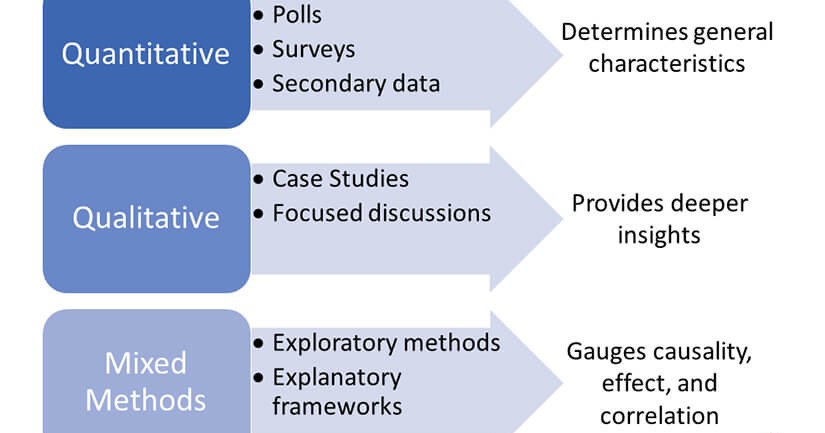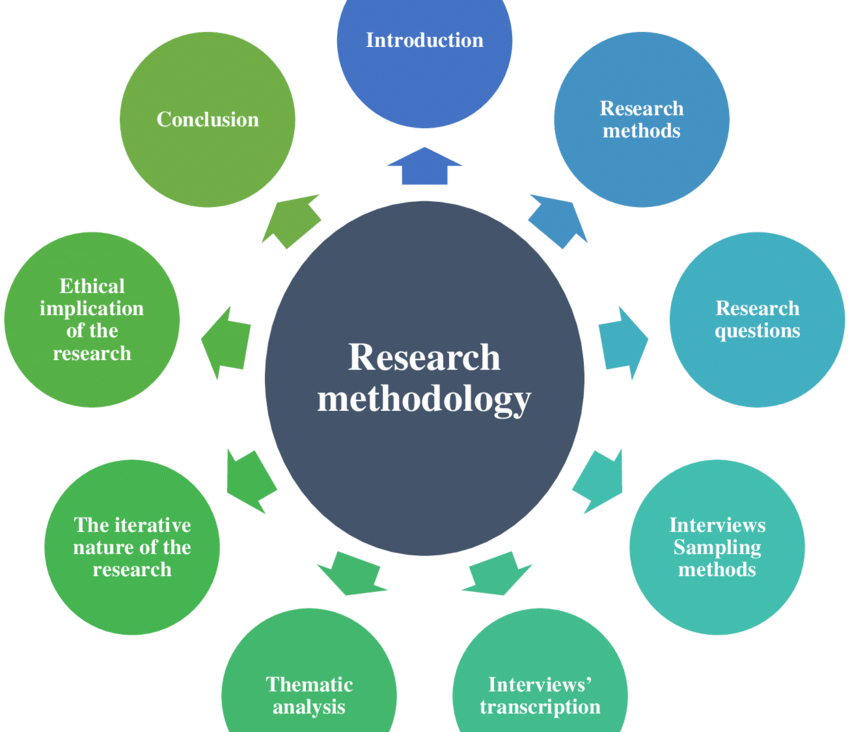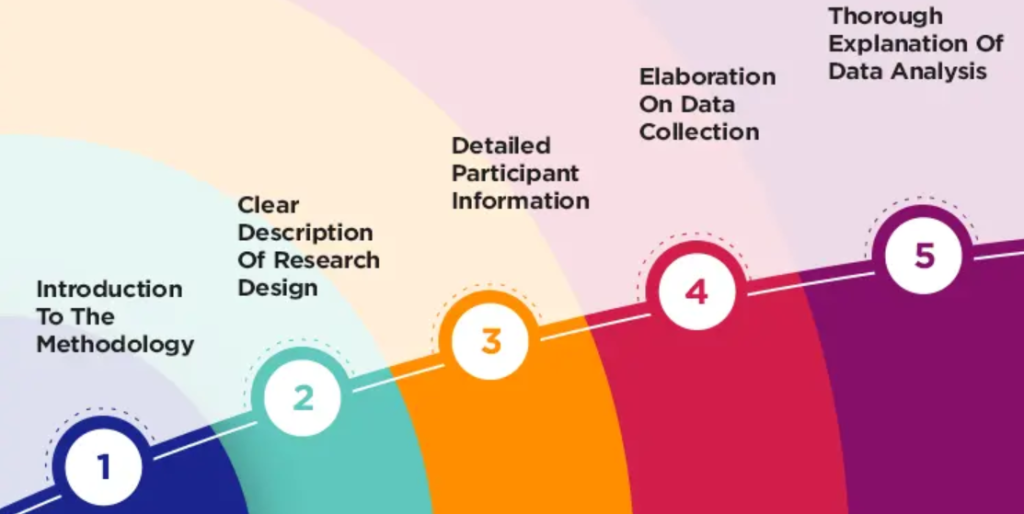
Table of Contents
The nursing dissertation methodology is the heart of your research journey. It’s where you meticulously outline the approach you’ll take to answer your research question, setting the stage for a robust and credible study. Crafting a compelling nursing dissertation methodology requires a delicate balance between scientific rigor and clarity. It’s about showcasing the ‘why’ and ‘how’ of your research design, ensuring your readers understand and trust the journey you’re embarking on.
This article provides comprehensive guidelines for crafting a compelling nursing dissertation methodology, covering key aspects from defining your research design to ensuring ethical considerations are addressed.
The Key Elements of a Nursing Dissertation Methodology
The nursing dissertation methodology is the backbone of your research, outlining how you will answer your research question. Its key elements are interconnected and ensure your study’s scientific rigor and trustworthiness. Here’s a breakdown:
1. Research Design: This section defines the overall approach you’ll take. The choice of design – quantitative, qualitative, or mixed methods – depends on your research question and the nature of the phenomenon you’re investigating. A well-defined research design guides the selection of data collection methods and analysis techniques.
2. Participants & Sampling: You need to define your target population and how you’ll select a representative sample. This includes detailing the inclusion and exclusion criteria for participants, as well as the sampling method used (random, stratified, convenience, etc.).
3. Data Collection Methods: This section elaborates on the specific tools and procedures for gathering data. It should be detailed and clear, including information about the instruments used (e.g., questionnaires, interview guides), their reliability and validity, and the data collection process.
4. Ethical Considerations: Since nursing research involves human participants, this section is critical. It outlines the ethical principles adhered to, including informed consent, confidentiality, beneficence, non-maleficence, and justice. You should detail how these principles are implemented throughout the research process.
5. Data Analysis Techniques: This section describes the methods you’ll use to analyze the collected data. It should explain the chosen statistical or qualitative analysis techniques (e.g., thematic analysis, regression analysis) and how they are aligned with your research question and data type.
6. Limitations: A well-structured nursing dissertation methodology acknowledges the potential limitations of the study. This could include factors like sample size, generalizability, or the specific data collection methods used. Recognizing these limitations demonstrates your understanding of the research process and enhances the credibility of your findings.
7. Timeline: While not always explicitly stated, a timeline helps demonstrate the feasibility of your research plan. It outlines the major stages and expected duration of your project, contributing to its overall clarity.
By comprehensively addressing these key elements, your nursing dissertation methodology will provide a solid foundation for your research, contributing to a credible and impactful dissertation.
Steps to Writing Nursing Dissertation Methodology
1. Defining the Research Design: The Foundation of Your Nursing Dissertation Methodology
Choosing the appropriate research design is a critical first step in your nursing dissertation methodology. It sets the stage for how you’ll collect and analyze data, shaping the entire structure of your study. Here’s a breakdown of common research designs relevant to nursing research, each with its unique strengths and limitations:
- Quantitative Research: This approach seeks to measure and quantify phenomena, often using structured questionnaires, surveys, and statistical analysis. It’s ideal for examining relationships between variables, testing hypotheses, and generating generalizable findings. For example, a quantitative study might aim to measure the effectiveness of a specific nursing intervention on patient satisfaction.
- Qualitative Research: This approach delves into subjective experiences, meanings, and interpretations. It uses methods like interviews, focus groups, and observation to gather rich, detailed data. Qualitative research excels at exploring complex social phenomena, uncovering hidden perspectives, and understanding lived experiences. A qualitative study might investigate the impact of a chronic illness on patients’ daily lives, capturing their personal narratives and coping strategies.
- Mixed Methods Research: This approach combines both quantitative and qualitative methods, leveraging the strengths of each to provide a comprehensive understanding of a research problem. For instance, a mixed methods study could use a quantitative survey to measure patient satisfaction while also conducting qualitative interviews to explore the reasons behind those satisfaction levels.

2. Crafting Your Research Question: The Guiding Star of Your Nursing Dissertation Methodology
A well-crafted research question is the cornerstone of your nursing dissertation methodology. It sets the direction for your study, guiding your choice of research design, data collection methods, and analysis techniques. A strong research question is:
- Specific: It avoids vague language and focuses on a clearly defined aspect of your research problem.
- Measurable: It allows you to quantify or assess the variables involved.
- Achievable: It’s realistic within the constraints of your time, resources, and scope.
- Relevant: It aligns with current knowledge and contributes meaningfully to the field of nursing.
- Time-bound: It sets a clear timeframe for your study.
For example, instead of a broad question like “What are the challenges faced by nurses working in critical care?” a more specific and measurable research question might be “How does workload affect nurses’ perceived stress levels in a critical care unit, and what strategies do they use to cope?”
3. Selecting Your Sample: Ensuring Representativeness in Your Nursing Dissertation Methodology
The sample you choose for your nursing dissertation methodology will have a significant impact on the generalizability of your findings. You need to carefully consider the characteristics of your target population and select a sample that accurately represents them.
- Population: The entire group of individuals you’re interested in studying.
- Sample: A subset of the population that you’ll actually collect data from.
When selecting your sample, you need to choose a sampling method that aligns with your research design and ensures the representativeness of your findings. Common sampling methods include:
- Random Sampling: Each member of the population has an equal chance of being selected for the sample. This method is ideal for ensuring generalizability and minimizing bias.
- Stratified Sampling: The population is divided into subgroups based on relevant characteristics (e.g., age, gender), and a random sample is drawn from each subgroup. This method ensures that each subgroup is proportionally represented in your sample.
- Convenience Sampling: Participants are selected based on their ease of access. While convenient, this method can introduce bias and limit the generalizability of your findings.
4. Choosing Data Collection Methods: Gathering Information for Your Nursing Dissertation Methodology
Data collection methods are the tools you use to gather information to answer your research question. The choice of method depends on your research design, research question, and ethical considerations. Some common methods include:
- Surveys: Structured questionnaires used to collect quantitative data from a large group of participants.
- Interviews: Semi-structured or unstructured conversations with participants to gather in-depth qualitative data about their experiences and perspectives.
- Focus Groups: Group discussions facilitated by a researcher to gather qualitative data on shared experiences, perceptions, and attitudes.
- Observation: Systematic recording of behaviors, events, and interactions in a specific setting.
- Physiological Measures: Use of instruments to collect data on physiological variables like heart rate, blood pressure, and brain activity.
5. Ensuring Ethical Considerations in Your Nursing Dissertation Methodology
Ethical considerations are paramount in nursing research, as the well-being of participants must be prioritized. The following ethical principles are essential for your nursing dissertation methodology:
- Informed Consent: Participants must be fully informed about the research and its potential risks and benefits before they agree to participate.
- Confidentiality: Participants’ identities and personal information must be kept confidential, and data should be anonymized to protect their privacy.
- Beneficence: The research should aim to benefit participants, or at least not cause them harm.
- Non-maleficence: The research should avoid causing harm to participants.
- Justice: The benefits and risks of the research should be distributed fairly among participants.
6. Choosing Data Analysis Techniques: Uncovering Insights from Your Nursing Dissertation Methodology
The data analysis techniques you select for your nursing dissertation methodology will depend on your research design, research question, and the type of data you collect. Some common techniques include:
- Quantitative Data Analysis:
- Descriptive Statistics: Measures like mean, median, mode, and standard deviation to summarize data and identify trends.
- Inferential Statistics: Tests like t-tests, ANOVA, and regression analysis to draw conclusions about population parameters based on sample data.
- Qualitative Data Analysis:
- Thematic Analysis: Identifying key themes and patterns emerging from qualitative data.
- Grounded Theory: Developing theories grounded in the data collected.
- Content Analysis: Analyzing the content of texts or other materials to identify patterns and meanings.
7. Writing Your Methodology Chapter: A Clear and Concise Guide in Your Nursing Dissertation Methodology
The methodology chapter of your nursing dissertation is where you present your research design, methods, and data analysis techniques in detail. Here are key components to include:
- Introduction: Provide an overview of the research design, explaining why you chose this approach and how it aligns with your research question.
- Participants: Describe your target population, sampling method, and the characteristics of your sample.
- Data Collection Methods: Detail each data collection method used, including specific instruments, procedures, and how data was recorded.
- Ethical Considerations: Outline the ethical safeguards implemented to ensure participant safety and well-being.
- Data Analysis: Explain the data analysis techniques chosen, including specific software used and the steps involved in analyzing the data.
- Limitations: Acknowledge any potential limitations of your study design and methods.

8. Reviewing and Refining Your Nursing Dissertation Methodology: Ensuring Rigor and Clarity
Once you’ve drafted your methodology chapter, it’s essential to critically review and refine it. Seek feedback from your advisor, peers, and other researchers to ensure your methodology is:
- Logical: The research design, methods, and data analysis techniques are logically connected and clearly support your research question.
- Rigorous: The methods are scientifically sound and have a strong theoretical basis.
- Feasible: The research is achievable within the constraints of your time, resources, and ethical considerations.
- Clear and Concise: The language is precise and easy to understand, even for readers outside your field of expertise.
9. Key Considerations for Writing a Compelling Nursing Dissertation Methodology
- Alignment with Research Question: Ensure your methodology directly addresses your research question, demonstrating how the design, methods, and analysis will provide answers.
- Justification for Choices: Clearly explain the rationale behind every decision, from the research design to the specific data collection methods and analysis techniques.
- Transparency and Replicability: Provide sufficient detail for others to understand and potentially replicate your study.
- Critical Evaluation: Acknowledge any potential limitations or biases within your methodology and discuss how these might affect the validity of your findings.
- Ethical Awareness: Demonstrate your commitment to ethical research by explicitly addressing informed consent, confidentiality, and other relevant ethical principles.
Sample Nursing Dissertation Methodology Outline
Introduction
This dissertation aims to explore [briefly state your research question]. To achieve this objective, a [state your research approach, e.g., quantitative, qualitative, mixed-methods] approach will be employed. This methodology section will outline the specific methods used for data collection, analysis, and interpretation, justifying the chosen methods and their suitability for the study.
Research Design
[Describe your specific research design, e.g., randomized controlled trial, case study, phenomenological study, etc. Briefly explain why this design was chosen and its suitability for your research question.]
Population and Sampling
[Define the target population for your study, specifying their characteristics and how they relate to your research question. Explain the sampling technique employed, e.g., random sampling, purposive sampling, etc., and why it was chosen. Explain how the sample size was determined and its relevance to the study’s power and feasibility.]
Data Collection
[Describe the specific methods used to collect data, such as questionnaires, interviews, observations, etc. For each method, explain its relevance to the research question, how it will be implemented, and any ethical considerations involved. Discuss any instruments used, their reliability and validity, and any modifications made.]
Data Analysis
[Explain how the collected data will be analyzed, aligning it with your chosen research approach and design. Describe the specific analytical tools and techniques employed, e.g., statistical analysis, thematic analysis, content analysis, etc., and justify their use. Discuss the potential challenges and limitations in data analysis.]
Ethical Considerations
[Highlight the ethical considerations relevant to your research, addressing:
* Informed consent and participant confidentiality
* Potential risks and benefits for participants
* Data security and anonymity
* Conflict of interest and ethical review procedures
* Any specific considerations relevant to your chosen population or setting]
Study Limitations
[Acknowledge any limitations inherent in your chosen methodology and data collection methods, such as sample size, generalizability, or potential biases. Discuss how these limitations may impact the findings and the study’s overall significance.]
Data Interpretation
[Explain how the data will be interpreted to answer the research question and contribute to existing knowledge in the field. Outline the criteria used to draw conclusions from the analysis and the potential implications of the findings for nursing practice and future research.]
Timeframe and Resources
[Provide a brief outline of the study’s timeframe and the resources required for its completion. This can include personnel, equipment, funding, and other necessary support.]
Conclusion
[Reiterate the importance of the chosen methodology and its suitability for answering the research question. Emphasize how the methods employed will ensure the rigor and validity of the findings, contributing to a robust and valuable contribution to the body of nursing knowledge.]
Note: This is a sample methodology section and should be adapted to your specific research question, design, and methods. Remember to provide specific details and justifications for each aspect of your methodology to demonstrate its rigor and relevance to your research.
Frequently Asked Questions about Nursing Dissertation Methodology
Here are some common questions that arise when considering the methodology for a nursing dissertation:
1. What research design is best for my nursing dissertation methodology?
This depends on your specific research question and aims. There are numerous designs, like quantitative (e.g., experimental, correlational), qualitative (e.g., phenomenology, ethnography), and mixed-methods approaches. Your choice should align with the type of data you want to gather and the questions you want to answer.
2. How do I choose appropriate data collection methods for my nursing dissertation methodology?
Consider the nature of your research question and the type of data you need. Popular methods in nursing dissertations include:
- Surveys and Questionnaires: Gather quantitative data on attitudes, beliefs, or behaviors.
- Interviews: Collect in-depth qualitative data on individual experiences and perspectives.
- Focus Groups: Explore group dynamics and shared experiences.
- Observations: Collect data on behaviors and interactions in natural settings.
- Secondary Data Analysis: Utilize existing data sets (e.g., medical records, patient satisfaction surveys).
3. How do I ensure the ethical integrity of my nursing dissertation methodology?
Ethical considerations are paramount in nursing research. Key elements include:
- Informed Consent: Participants must understand the study’s nature and risks before agreeing to participate.
- Confidentiality: Protect participant identities and data privacy.
- Beneficence: Ensure the research benefits participants and avoids harm.
- Justice: Ensure fair and equitable treatment of participants.
- Institutional Review Board (IRB) Approval: Seek approval from the IRB to conduct your research ethically.
4. How do I ensure the rigor and reliability of my nursing dissertation methodology?
Rigor refers to the scientific soundness of your research. Here’s how to ensure it:
- Clear and Specific Research Question: Formulate a precise and measurable question to guide your research.
- Appropriate Design and Methods: Choose the design and methods most suited to your question and data type.
- Reliable and Valid Data Collection Instruments: Use established instruments or validate new ones for accuracy and consistency.
- Robust Data Analysis: Employ appropriate statistical techniques or qualitative coding methods for your data.
- Transparency and Disclosure: Clearly document your methodology, including potential limitations and biases.
5. What are some common challenges in developing a nursing dissertation methodology?
Developing a strong nursing dissertation methodology can pose challenges:
- Choosing a design and methods that are appropriate and feasible: This requires careful consideration of the research question, available resources, and potential limitations.
- Recruiting and retaining participants: Ensuring sufficient participants is crucial, especially for qualitative studies.
- Ensuring ethical guidelines are met: This involves navigating IRB protocols and ensuring participant safety and well-being.
- Managing time and resources: Conducting research often involves tight deadlines and resource constraints.
6. How can I find resources and support for developing my nursing dissertation methodology?
Numerous resources can assist you:
- University Library: Access research databases, books, and online resources.
- Faculty Advisor: Seek guidance and mentorship from your dissertation advisor.
- Research Methods Courses: Enroll in relevant courses to strengthen your methodological skills.
- Professional Organizations: Join nursing research societies for networking and professional development.
Remember: Developing a strong nursing dissertation methodology is essential for producing rigorous and impactful research. By addressing these questions and seeking guidance, you can create a methodology that supports your research aims and contributes to the body of nursing knowledge.

The Cornerstone of a Successful Nursing Dissertation
A strong nursing dissertation methodology is not just a technical requirement; it’s the foundation of your entire research project. It’s about demonstrating your understanding of research principles, your ability to design a robust and credible study, and your commitment to ethical research practices.
By following these guidelines, you can craft a compelling nursing dissertation methodology that showcases the rigor, clarity, and ethical awareness essential for a successful research journey. Remember, your methodology is the roadmap for your research, guiding you towards meaningful and impactful findings that contribute to the advancement of nursing knowledge and practice.
Get Professional Nursing Dissertation Writing Service
At Nursing Papers, we offer professional nursing dissertation writing service for Master’s and PhD. We have experienced writers to help you with writing every section of your dissertation from the introduction to conclusion. Our service also caters for proofreading and editing, formatting and plagiarism removal. Besides, we also provide customized academic writing assistance with nursing research papers, essays, case studies and thesis.







